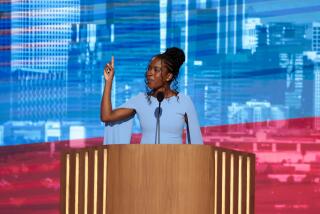A Plains voice in trying times
- Share via
Ted Kooser was out there in the Nebraska heartland, in the landscape he loves, on the 62 acres of it he owns and monitors with what he calls “wolf vision” for late-breaking news from the natural world.
Birds, spiders, coyotes with curled lips; moths so relaxed they fall off ledges, forgetting that they can fly. The way a snake moves: “All it knows is behind it already/nothing it knows is ahead.” Small observations that Kooser transforms in the early morning hours into poems that he imagines few people will ever read. Poetry is not the national passion it might be. And his books, while highly acclaimed by critics, typically sell only about 2,000 or 3,000 copies each, he says.
Kooser was out there in the Great Plains late last week, contemplating nature and what to eat for dinner, when the phone rang and a man on the other end announced upheaval in his life. “He said I’d been chosen” as the nation’s poet laureate and “would I accept the position.”
Kooser couldn’t answer. “I was so completely surprised, so staggered by it, that the man said maybe he’d better call me back the next day and try again. I simply couldn’t think. It’s not something that I had ever considered might happen.”
But of course, Kooser accepted the prestigious one-year position, which pays $35,000 and confers a lot of opportunity but little obligation. He wouldn’t have to leave home too often, he says: “About four times during the year when I will be needed at the Library [of Congress] in Washington.”
If he wishes to take a more active role, he is welcome to do so. Although the position was considered largely ceremonial for many years, it has recently become an activist’s platform for poets to disseminate verse beyond libraries and universities to the great masses of Americans who might not otherwise come in contact with it. In fact, that is the official job description of America’s poet laureate: “To raise the status of poetry in the everyday consciousness of the American public.”
Some previous laureates, such as Billy Collins and Robert Pinsky, worked to dispel the “perception that perhaps poetry is only for highbrow readers,” says Theresa Eiben, editor of Poets and Writers magazine. “Pinsky went to the public and reminded them that they already knew poems that they had once learned as a child.” His “Favorite Poem” project documents on video Americans of every stripe, all reading and speaking about their favorite poems.
Collins’ program, “A Poem a Day for American High Schools,” urges schools to make poetry a daily event, either over the loudspeaker or in other ways. Robert Hass, another former poet laureate, wrote a nationally syndicated column for the Washington Post for four years, introducing poetry to readers. His ongoing “River of Words” project encourages children to make art and poetry.
Kooser, who succeeds Louise Gluck, has no idea exactly what he’ll do in office but says he already has some interesting activist ideas. He is 65 and a few years ago was successfully treated for oral cancer, after which he retired from his 35-year career in the insurance industry.
He has written poetry since the age of 18, awakening every morning at 4:30 and writing until it was time to go to work.
His selection as poet laureate is an “interesting choice” in an unusually complicated year for the nation, according to some in the poetry community. With the presidential election, the war in Iraq, the aftermath of Sept. 11, 2001, and the threat of new terrorist attacks, the right appointment seemed particularly critical, Eiben says. In times of trouble, “people have historically turned to poetry” to help “find our humanity and strengthen it even more.”
“I knew they were scratching their heads on this,” says Hass, “trying to find someone from the heartland, doubly concerned about how to pick anyone in an election year.” (Last year, Laura Bush canceled a White House poetry symposium after thousands of poets wrote protest poems against the war in Iraq.)
Kooser is the first poet laureate ever chosen from the Great Plains, Librarian of Congress James H. Billington said when he announced the appointment Aug. 12. “He is a major poetic voice for rural and small-town America,” but “his verse reaches beyond his native region to touch on universal themes in accessible ways.”
It is Billington and Prosser Gifford, director of the library’s Scholarly Programs department, who appoint the poet laureate after consulting with members of the poetry community each year. There is no formal panel of consultants; the names of those with whom they confer are not made public.
“It’s a process, talking to previous poet laureates and others -- but not the same people every year,” Billington says. “We want, over time, to reflect the fact that there are many schools of poetry and many good poets in each of those schools.”
Kooser’s work is simple, plainspoken, touching but not sentimental. It deals with universals of nature and the human condition, distilling the obvious into something unexpectedly full of luminous grace. He has been likened to Robert Frost, Edgar Lee Masters and William Carlos Williams.
“Kooser has written more perfect poems than any poet of his generation,” stated Dana Gioia, poet and National Endowment for the Arts chairman.
But Kooser says he is not concerned about other poets’ opinions of his work. He preferred to write for regular folks, in such a way that people “who are not professional literary people can understand my work.” He has always showed his new poems to those around him. “I used to show them to my secretary at the insurance company, for example. If she didn’t understand it, I’d go home and rewrite it until she did.
“Poetry can do some remarkable things for people if they have access to it. It gives you fresh new ways of looking at an ordinary-appearing world. Once you read my friend Joe Hutchison’s words about an artichoke -- ‘Oh heart, weighed down by so many wings’ -- once you read that, you can never look at an artichoke the same way again.”
Kooser’s own work has some of the same transformative effect, like “Walking on Tiptoe,” a poem about the difference in how animals and humans walk:
Long ago we quit lifting our heels
like the others -- horse, dog, and tiger --
though we thrill to their speed
as they flee. Even the mouse
bearing the great weight of a nugget
of dog food is enviably graceful.
There is little spring to our walk,
we are so burdened with responsibility,
all of the disciplinary actions
that have fallen to us, the punishments,
the killings, and all with our feet
bound stiff in the skins of the conquered.
But sometimes, in the early hours,
we can feel what it must have been like
to be one of them, up on our toes,
stealing past doors where others are sleeping,
and suddenly able to see in the dark.
After his illness, Kooser wrote a 17-line poem called “At the Cancer Clinic,” which describes with exquisite simplicity a patient who is both tragic and blessed. There is pride in Kooser’s voice as he says his doctor liked the poem so much that he “had it enlarged and hung it on the wall at the nurses’ station.” Hopefully, others will find it comforting, he says.
The announcement of Kooser as the nation’s new head poet caused barely a ripple in the media. Although poetry has become more mainstream in the past few years, the average American still wends his or her way through life without reading much meaningful verse.
It has not always been that way. At certain brief moments in our history, poetry has mattered in ordinary households. Americans loved poetry in the 19th century; in the 1920s, crowds thronged to hear Edna St. Vincent Millay read her work. In the ‘40s and ‘50s, popular magazines to which millions subscribed included poetry in each issue and public school children memorized lines by Robert Frost and Walt Whitman, much as they memorized the Pledge of Allegiance.
The very existence today of the poet laureate position indicates that some part of officialdom considers poetry an important art form. Yet it has become increasingly difficult for the average citizen to explain why.
The NEA’s Gioia addressed the question in his famous essay “Can Poetry Matter?”: “In a better world, poetry would need no justification beyond the sheer splendor of its own existence. As Wallace Stevens once observed, ‘The purpose of poetry is to contribute to man’s happiness.’ ... Aesthetic pleasure needs no justification because a life without such pleasure is not one worth living.”
As to why poetry is essential, he writes: “A society whose intellectual leaders lose the skill to shape, appreciate and understand the power of language will become the slaves of those who retain it -- be they politicians, preachers, copywriters or newscasters.”
But Gioia is optimistic for poetry’s future, he said in an interview Monday. “It’s primarily an art of spoken language, and with our increasingly electronic culture, poetry becomes a more natural art form,” he says. “We have entered a secondary aural culture in which we are electronically bombarded by messages, selling us things. One importance of poetry is that it exists outside the marketplace.”
More to Read
Sign up for our Book Club newsletter
Get the latest news, events and more from the Los Angeles Times Book Club, and help us get L.A. reading and talking.
You may occasionally receive promotional content from the Los Angeles Times.








